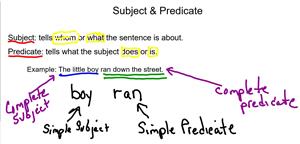-
Modular 1 Week 1 – Subjects and Predicates
Complete Subjects and Predicates
Simple sentence expresses a complete thought. It has a subject and a predicate.
- Subject: tells whom or what the sentence is about.
- Predicate: tells what the subject does or is.
The complete subject includes all the words in the subject part of the sentence. The complete predicate includes all the words in the predicate part of the sentence.
Simple Subjects
The simple subject is the most important word in the complete subject. The simple subject tells exactly whom or what the subject is about. Sometimes the subject of a sentence is just one word. Sometimes it is a name. Then the simple subject and the complete subject are the same. Most of the time, however, the simple subject is part of the complete subject.
Simple Predicates
The simple predicate is the most important word in the complete predicate. The simple predicate tells exactly what the subject does or is. Sometimes the predicate of a sentence is just one word. Then the simple predicate and the complete predicate are the same. Most of the time, however, the simple predicate is part of the complete predicate.

Compound Sentences
A simple sentence has one subject and one predicate. It expresses one idea. Sometimes two simple sentences contain related ideas. You can combine these sentences to make a compound sentence. Use a connecting word such as and, but, or or to join the sentences.
Example: The National Zoo is huge. It has animals from all over the world. (two simple sentences) The National Zoo is huge, and it has animals from all over the world. (compound sentence)
Complex Sentences
Remember that compound sentences combine related ideas using a connecting word such as and, but, or or. A complex sentence also combines related ideas. The ideas are joined by a subordinating conjunction. Common subordinating conjunctions are: after, although, because, before, since, until, when, while.

